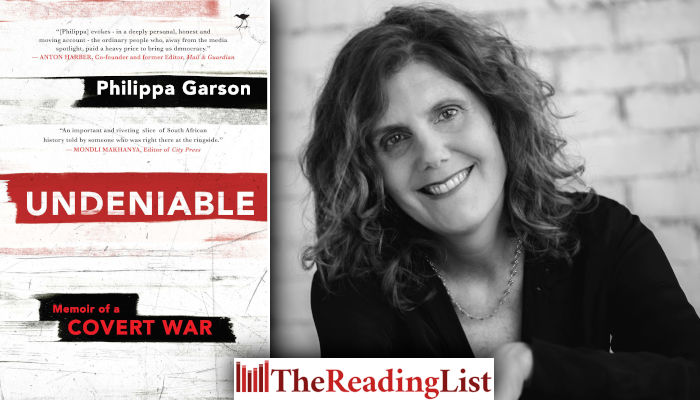Shedding light on a blood-soaked chapter in South Africa’s history – Read an excerpt from Philippa Garson’s memoir Undeniable: Memoir of a Covert War
More about the book!

Jacana Media has shared an excerpt from Undeniable: Memoir of a Covert War by Philippa Garson.
‘Although some may find the violence triggering, it is my specific intention to not sidestep the uncomfortable truth about this time.’
Garson worked for the brave and upstart Weekly Mail during the early 1990s, where she covered the civil war between Inkatha and ANC-aligned communities. Undeniable is an account of that period of her life, where she and colleagues, Mondli Makhanya, Kevin Carter, Eddie Koch, Anton Harber and others, tracked and discovered the involvement of a Third Force, which was fuelling the killing frenzy.
There were times when Garson escaped with her life. In this book, she tells of the casualties, victims of war and colleagues who did not. Her relationship across the colour line and partying during the off-hours in an effort to diminish the pain of what she had witnessed are all part of this brilliant account of a harrowing period in South African history.
It is a period that has not been investigated sufficiently, and which escaped much scrutiny from the Truth and Reconciliation Commission. Rogues, lovers, family, friends, journalists, warlords and victims are all part of Garson’s gripping memoir, in which she explores what it was like to investigate apartheid crimes through the lens of white privilege.
Read the excerpt:
~~~
Prologue
In 2008 I moved with my family to New York to try out a new life. During long periods of loneliness and grief at leaving the country of my birth and my beloved extended family, I began to write about the traumatic events that I’d witnessed during my time as a reporter at the Weekly Mail (now Mail & Guardian), events that had been buried in the recesses of my memory for years.
These events took place during the tumultuous period from 1990 to 1994, after Nelson Mandela’s release and before democratic elections, when an orgy of violence was visited on the country, resulting in the deaths of at least fourteen thousand people.
The more I revisited this time, the more I tossed and turned at night. It was as if I was tapping into a momentous river of anguish that runs silently under the soil of this country. Increasingly, I felt driven to shed light on this blood-soaked chapter in the country’s history, one that has been airbrushed out of our collective consciousness.
The transition to democracy was indeed a miracle: the country was spared the full-scale revolution that many saw as inevitable. But during the years preceding it, the nation swung between optimism and despair as breakthroughs in negotiations between the apartheid government and the ANC were punctuated by massacres on trains, in homes, shebeens, hostels and elsewhere. The relentless and indiscriminate attacks on communities, often by unidentified gunmen, left deep scars on the land.
The Weekly Mail was a small newspaper intent on exposing the atrocities that unfolded. No matter our level of expertise, we journalists and photojournalists were thrust headfirst into reporting on the carnage and trying to unmask the ‘third force’ behind it. Some colleagues, like Wally Mbhele, were far more frequent visitors to the killing fields; and more senior journalists than I were covering the main political story or heading up investigations to uncover the hidden forces stoking the violence.
But this is the story of my own experiences as a reporter during this tumultuous time. It is also not an exhaustive historical account, but a documenting of events as they unfolded before me, and my attempt all these years later, to make sense of it all.
In these pages, I weave my personal story into the political one charting my own loss of innocence as I, a privileged white ‘party girl’ from a liberal-leaning household, traversed back and forth between colliding realities, all the while trying to navigate a cross-racial relationship during apartheid’s last days.
In the spirit of narrative non-fiction I have recreated scenes, some from memory, some from articles I wrote. I have also changed a few names where appropriate. Many of the characters in this book stay until the end; others are fleeting. The journalist’s lot is to badger their subjects with intrusive questions and then to move along, never to speak to them again, or to know how they fared. It is a blighted lot, a karmic load, which I reflect on in these pages. While I found it appropriate to name the nameless where possible, for the purposes of this story, the reader need not remember them all.
Although some may find the violence triggering, it is my specific intention to not sidestep the uncomfortable truth about this time. Hopefully, those perpetrators who evaded justice for the cynical war they stoked continue to be harassed by their consciences. For the rest who lost their loved ones, the thousands to whom this book is dedicated, no one can take away their suffering. It is theirs to bear and to own. The best one can do is to acknowledge it, which I hope, in some small way, this book does.
Categories Non-fiction South Africa South African Current Affairs
Tags Book excerpts Book extracts Jacana Media Philippa Garson Undeniable
